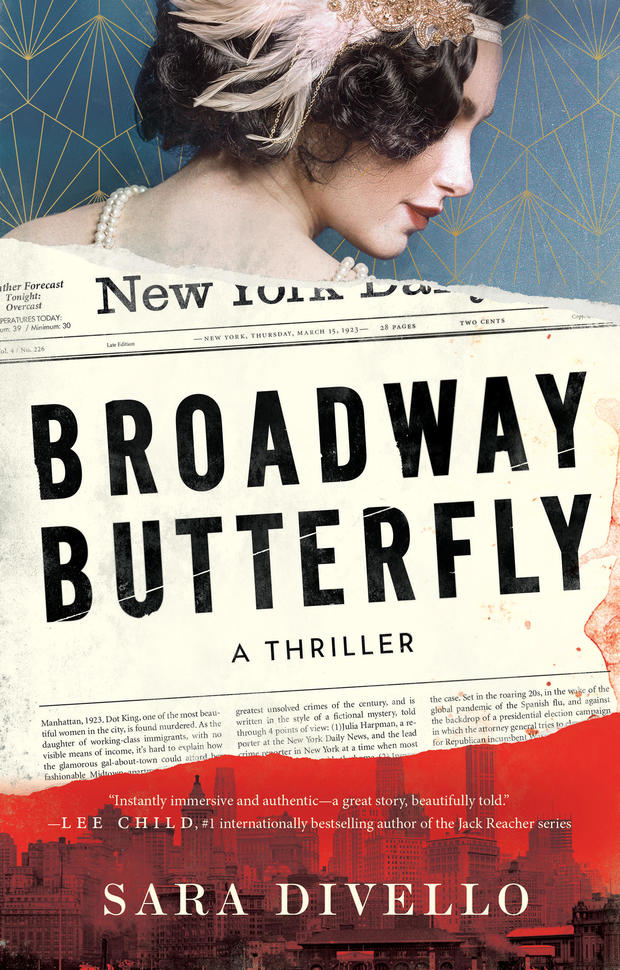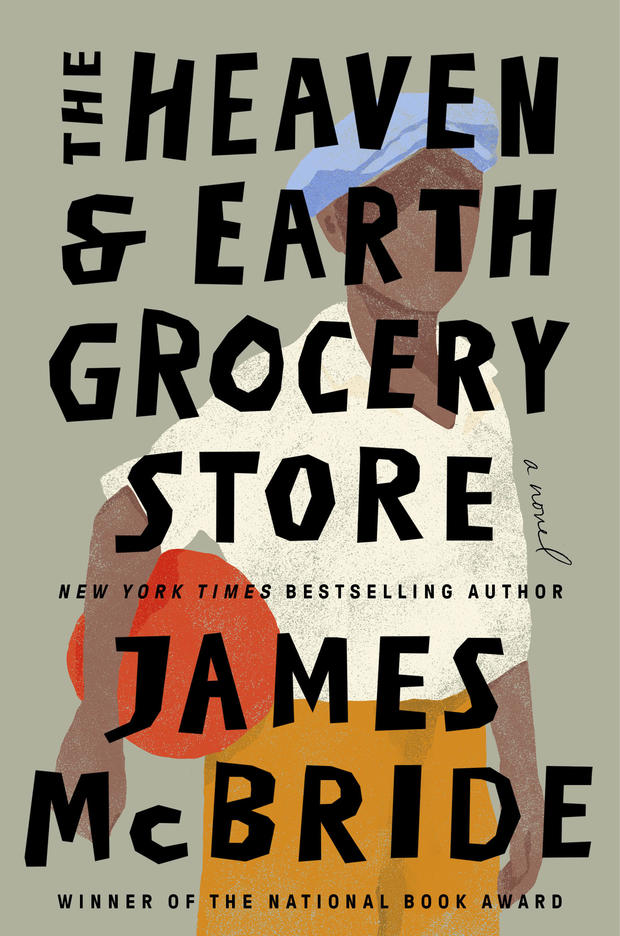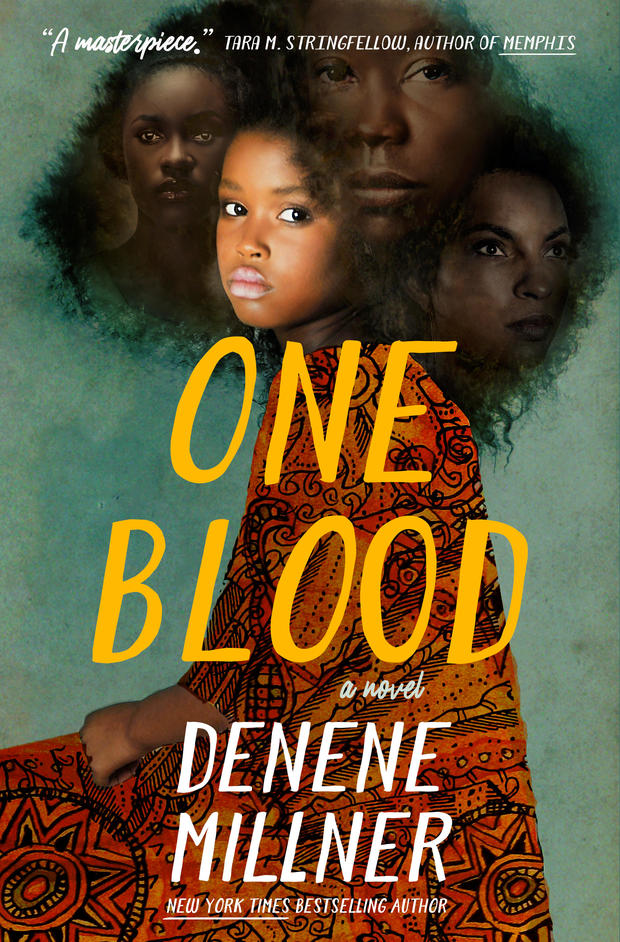Learn more about our first fall FicPicks!
Please consider joining our Facebook group by CLICKING HERE.
Find out more about the books below.
Voting now closed for the next read for the CBS New York Book Club with Mary Calvi!
Secrets, crime and community. The CBS New York Book Club team selected three new fiction books, and voting for the book #ClubCalvi will read next month ended on Sunday night at 6 p.m. The Readers' Choice will be revealed on Wednesday, Sept. 6.
The "FicPicks" that were nominated have plots and/or authors connected to New York, New Jersey or Connecticut.
Below you will find information on our "Top 3 FicPicks."
They are "Broadway Butterfly" by Sara DiVello, "The Heaven & Earth Grocery Store" by James McBride, and "One Blood" by Denene Millner. Two books are available now, the other will be released on September 5. These books may contain adult themes.
Prefer to listen? Audible has a 30-day free trial available right now.
"Broadway Butterfly" by Sara DiVello
From the publisher: A true-crime novel based on one of the most notorious unsolved murders of the roaring twenties. Scandalous flapper Dot King is found dead in her Midtown Manhattan apartment, a bottle of chloroform beside her and a fortune in jewels missing. Dot's headline-making murder grips the city. It also draws a clutch of lovers, parasites, and justice seekers into one of the city's most mesmerizing mysteries.
Among them: Daily News crime reporter Julia Harpman, chasing the story while navigating a male-dominated industry; righteous NYPD detective John D. Coughlin, struggling against city corruption; and Ella Bradford, the victim's Harlem maid, closest confidante, and keeper of secrets. Adding fuel to the already volatile crime: a politically connected Philadelphia socialite, an Atlantic City bootlegger, Dot's dicey gigolo lover, a sultry Broadway dancer, and a cagey sugar daddy guarding secrets of his own.
Sara DiVello is the founder and host of the author interview series, Mystery and Thriller Mavens.
"Broadway Butterfly" by Sara DiVello (Hardcover) $19
"Broadway Butterfly" by Sara DiVello (Kindle) $5
"The Heaven & Earth Grocery Store" by James McBride
From the publisher: In 1972, when workers in Pottstown, Pennsylvania, were digging the foundations for a new development, the last thing they expected to find was a skeleton at the bottom of a well. Who the skeleton was and how it got there were two of the long-held secrets kept by the residents of Chicken Hill, the dilapidated neighborhood where immigrant Jews and African Americans lived side by side and shared ambitions and sorrows. Chicken Hill was where Moshe and Chona Ludlow lived when Moshe integrated his theater and where Chona ran the Heaven & Earth Grocery Store. When the state came looking for a deaf boy to institutionalize him, it was Chona and Nate Timblin, the Black janitor at Moshe's theater and the unofficial leader of the Black community on Chicken Hill, who worked together to keep the boy safe.
When the truth is finally revealed about what happened on Chicken Hill and the part the town's white establishment played in it, even in dark times, it is love and community—heaven and earth—that sustain us.
James McBride is a distinguished writer in residence at New York University and lives in New Jersey.
"The Heaven & Earth Grocery Store" By James McBride (Hardcover) $20
"The Heaven & Earth Grocery Store" (Kindle) $15
"One Blood" by Denene Millner
From the publisher: Three generations of women tied together by love, hope, dreams...and family secrets.
Grace: raised by her beloved grandmother in tension-filled, post-segregation Virginia, Grace is barely a teenager when she loses her grandmother. Shellshocked, she is shipped to Brooklyn to live with her formidably ambitious Aunt Hattie―a woman who firmly left behind her Southern roots in pursuit of upward mobility.
Delores: Delores a.k.a. Lolo has never had it easy. Once she makes it north, she puts aside her dream of being a model to do what she has to do to survive as a woman with little money and no mooring: get married and have a family of her own. When secrets start to spill out and she and her family slowly begin to unravel.
Rae: when Lolo's headstrong daughter, Rae, discovers that she is adopted, it's just one secret among others that her family is keeping. When Rae finds out that she's about to become a mother herself, she knows that there is an important reckoning that must be faced.
Denene Millner is editorial director of Denene Millner Books and lives in Atlanta.
"One Blood" By Denene Millner (Hardcover) $29
"One Blood" By Denene Millner (Kindle) $15
Excerpt: "Broadway Butterfly" by Sara DiVello
9:15 p.m. 25 Park Place, Manhattan. New York Daily News.
Julia rushed back to the converted five-story warehouse that the New York Daily News called home, and the smell of ink, paper, and cigarette smoke greeted her. With its pale stone front, Italianate cornices, and ornate moldings above every window, the building looked much the same as any of the lofts around it. But inside, the floor vibrated as the printing machines in the basement hummed to life, ready to churn out copies of the nation's largest morning daily. It felt like home.
She ignored the archaic birdcage elevator and ran up the stairs to the second floor, which housed the editorial department. She waved to the bench of copy boys waiting to run stories up to the linotype operators, who would then cast lines of metal type in preparation for printing.
"Julia!" Hellinger waved as she hurried into the narrow, long room toward the far end that served as the city desk. "Julia! We got a hot one!"
She hung her coat on the nearest coat-tree, slid into her seat. "OK, shoot," she said, realizing belatedly it was a poor choice of words, having just come from a murder-by-shotgun trial. "What's the story with the model?"
He twirled his fedora on a finger. "She was known along the roaring forties as the 'Broadway Butterfly.'"
The hairs on the back of Julia's neck rose, tingling in the prescient way that heralded a big story. The Broadway Butterfly. It was a title that would immediately hook readers, not only conveying the effervescence of a social butterfly but also homing in on that section of the city as ablaze with electric lights as it was with its heady culture of glamour: Broadway. There was nothing else like it in the world.
"Did you hear I'd met her?" Hellinger asked.
"I did," Julia observed dryly. "It seems Manhattan is no match for you." Even in a city of
millions, it stood to reason that Hellinger had crossed paths with the dead model—he not only covered the theater beat but made it his business to know as many of the city's beauties as possible.
"I also finagled access to the crime scene, and it turns out, this was no suicide. A small fortune of jewelry is missing, and some weird chloroform bottle, in a size nobody's ever seen before, was found next to the body," Hellinger said, ignoring the gibe.
Julia's pen raced across the paper. "What do you know about the victim herself?"
Hellinger passed her a photograph. Like every paper, the News kept stacks of photos of everyone notable in the city. "I pulled this. As you can see, Dot King was a real doll, and quite the gal about town. She had at least two lovers—Guimares, this flashy gigolo, and an elderly sugar daddy who kept her decked out in jewels and furs."
Julia studied the picture of the beautiful model shrugging gracefully in a white fur coat: lips painted in an exaggerated bow shape, perfectly waved hair chopped into a bob, wrists and fingers bedecked with bracelets and rings. The girl stared, unsmiling, directly into the camera, which made it now seem she stared directly at Julia. Julia, who always felt awkward in front of any camera, looked away from the model's frank, unabashed gaze.
"I'd see her around at the swankiest cabarets, always dressed to the nines. And I heard when she had parties, the Brevoort sent each course by taxi plus a waiter to serve cocktails," Hellinger said, consulting his notes. "Seems she had no shortage of admirers. I also heard she could be melancholy. She started worrying about getting bumped off a few months ago. Got so nervous, she even had her will drawn up with a special clause about something 'unforeseen' happening to her. Poor kid."
"Yes, well, it seems the 'poor kid' was right. Maybe next time a woman says she's worried she's in danger, someone in her life will listen. You know, before it happens," Julia said more sharply than she meant to.
"Hey, I listen!" Hellinger protested.
Julia rolled her eyes. "Did you talk to Coughlin?"
"Figured I'd leave that to you," Hellinger said.
Julia nodded. Coughlin had been promoted to chief inspector shortly before she'd arrived in New York, making him the head of nearly every investigation she'd covered, and therefore her go-to source for updates and quotes. He was notoriously brusque but mostly decent to reporters. He seemed to understand that they, like him, had a job to do: he caught crooks and they reported on it. Over the years, they'd developed a mutual respect, which was the most that could be hoped for between policeman and reporter, and which had probably grown out of the fact that both of their jobs required long, strange hours and a level of dedication that bordered on obsession. But even considering that was the norm, they were outliers, working round the clock, the first to arrive and the last to leave, always pushing for more.
She appreciated that when he found his hands tied by city politics, Coughlin was known to let reporters "eavesdrop" on calls where he loudly repeated key information. Most of all, she appreciated that he accepted her as a newspaperman—same as all the rest, in spite of her gender. That was rare.
Julia stood. "OK, if we want to make the morning edition, we gotta work fast. Since Coughlin already arrested Guimares, go straight for Marshall."
Hellinger held up a finger. "Just one problem: nobody knows who he is. 'Marshall' is a
pseudonym."
Julia froze. A pseudonym-wielding mystery man was the sizzle that took a story from the crime beat to the front page, and the front page was the difference between cases that got solved and cases that fell by the wayside. It was also, a small, calculating voice within her whispered, the sizzle that kept her employed and could propel her to a promotion as an assistant editor. Her fate was aligned with a dead woman's; such was the singular life of a crime reporter.
Excerpt from BROADWAY BUTTERFLY by Sara DiVello. Text copyright © 2023 by Sara DiVello
Excerpt: "The Heaven & Earth Grocery Store" by James McBride
The Hurricane
There was an old Jew who lived at the site of the old synagogue up on Chicken Hill in the town of Pottstown, Pa., and when Pennsylvania State Troopers found the skeleton at the bottom of an old well off Hayes Street, the old Jew's house was the first place they went to. This was in June 1972, the day after a developer tore up the Hayes Street lot to make way for a new townhouse development.
We found a belt buckle and a pendant in the well, the cops said, and some old threads— rom a red costume or jacket, that's what the lab shows.
They produced a piece of jewelry, handed it to him, and asked what it was.
A mezuzah, the old man said.
It matches the one on the door, the cops said. Don't these things belong on doors?
The old man shrugged. Jewish life is portable, he said.
The inscription on the back says "Home of the Greatest Dancer in the World." It's in Hebrew. You speak Hebrew? Do I look like I speak Swahili?
Answer the question. You speak Hebrew or not?
I bang my head against it sometimes.
And you're Malachi the dancer, right? That's what they say around here. They say you're a great dancer.
Used to be. I gave that up forty years ago.
What about the mezuzah? It matches the one here. Wasn't this the Jewish temple?
It was.
Who owns it now?
Who owns everything around here? the old man said. He nodded at the immense gleaming private school seen through the dim window. The Tucker School. It sat proudly atop the hill behind wrought- iron gates, with smooth lawns, tennis courts, and shiny classroom buildings, a monstrous bastion of arrogant elegance, glowing like a phoenix above the ramshackle neighborhood of Chicken Hill.
They been trying to buy me out for thirty years, the old man said.
He grinned at the cops, but he was practically toothless, save for a single yellow tooth that hung like a clump of butter from his top gum, which made him look like an aardvark.
You're a suspect, they said.
Suspect shuspect, he said with a shrug. He was well north of eighty, wearing an old gray vest, a rumpled white shirt holding several old pens in the vest pocket, a wrinkled tallit around his shoulders, and equally rumpled old pants, but when he reached inside his pants pocket, his gnarled hands moved with such deftness and speed that the state troopers, who spent most days ticketing tractor- railers on nearby Interstate 76 and impressing pretty housewives during traffic stops with their bubble- um lights and stern lectures about public safety, panicked and stepped back, their hands on their weapons. But the old man produced nothing more than several pens. He offered the cops one.
No thanks, they said.
They milled around for a while longer and eventually left, promising to return after they pulled the skeleton out of the well and studied the potential murder scene some more. They never did, though, because the next day God wrapped His hands around Chicken Hill and wrung His last bit of justice out of that wretched place. Hurricane Agnes came along and knocked the power out of four counties. The nearby Schuylkill River rose to a height of seven feet. To hear the old black women of Chicken Hill tell it, white folks was jumping off their rooftops in Pottstown like they was on the Titanic. All those fancy homes down there were swept away like dust. That storm killed everything it touched. Drowned every man, woman, and child that come near it; wrecked bridges, knocked down factories, tore up farms; that thing caused millions in damages— millions and millions—that's white- folks language, millions and millions. Well, for us colored folks on the Hill, it was just another day of dodging the white man's evil. As for the old Jew and his kind that was on this hill, they got all their time back from them that stole everything from 'em. And the Jew lady they wronged, Miss Chona, she got her justice, too, for the King of Kings fixed her up for all the good things she done, lifted her up and filled up her dreams in an instant in only the way He can. That evil fool who called hisself Son of Man, he's long gone from this country. And that boy Dodo, the deaf one, he's yet living. They put that whole camp up there in Montgomery County now on account of him, the Jews did. Theater owners they was, God bless 'em. And them cops and big-time muckity mucks that was running behind them Jews for the body they found in that old well, they can't find a spec against 'em now, for God took the whole business— the water well, the reservoir, the dairy, the skeleton, and every itty bitty thing they could'a used against them Jews— and washed it clear into the Manatawny Creek. And from there, every single bit of that who- shot- John nonsense got throwed into the Schuylkill, and from there, it flowed into the Chesapeake Bay down in Maryland, and from there, out to the Atlantic. And that's where the bones of that rotten scoundrel whose name is not worthy to be called by my lips is floating to this day. At the bottom of the ocean, with the fish picking his bones and the devil keeping score.
As for old Malachi, the cops never did find him. They come back for him after the hurricane business died away, but he was long gone. Left a sunflower or two in the yard and that's it. Old Mr. Malachi got off clean. He was the last of 'em. The last of the Jews round here. That fella was a wizard. He was something. He could dance, too . . . Lord . . . That man was magic . . .
Mazel tov, honey.
Excerpted from The Heaven & Earth Grocery Store by James McBride. Copyright © 2023 by James McBride. Excerpted by permission of Riverhead, an imprint and division of Penguin Random House LLC, New York. All rights reserved. No part of this excerpt may be reproduced or reprinted without permission in writing from the publisher.
Excerpt: "One Blood" by Denene Millner
"You smell it?" Rae asked. "It's been a while since he came, but he's here again. For you and the baby. Maybe for me."
"You used Daddy's aftershave?" LoLo asked, completely misunderstanding what, precisely, was happening.
"No, Mommy," Rae said gently. "That's Daddy's scent." Rae looked into her mother's eyes, her pupils piercing—her pupils saying exactly what LoLo needed to understand.
"He comes to you? Like this?"
"Sometimes it's his scent I smell—the aftershave," Rae said. "Some- times he comes to me in dreams. Once I woke up on a Sunday morning and smelled calf liver, plain as day. I jumped out of bed and raced into the kitchen and it was quiet and empty, everything in place. But it smelled like he was standing right there over the stove, cooking liver with that gravy I like, and rice. His favorite.
"I didn't tell you," Rae added, "because I thought . . . I thought you would think it was something evil."
"You know I don't believe in that hoodoo stuff. It's not in the Bible and God's word tells us not to worship false idols."
"Mommy, I don't have any control over this. I see things in my dreams all the time—have since I was little. I just never told you. I thought maybe I was evil or sinning against God because that's what you raised us to believe. But you smell him, too. How can Daddy's presence be evil?"
"Let me finish, Rae," LoLo said, raising her hand to shush her daughter. "I have something I need to show you. I'll be right back," she said.
LoLo disappeared back down the hall and reappeared just as quickly, with a small white pouch in her palm. She ran her thumbs over it slowly and stood there, her feet stuck to the linoleum Tommy had laid with his own hands when Rae was just a kid, dancing around on the other side of the kitchen threshold, regaling her father with a recap of her favorite book,
The Little Princess.
"This is yours," LoLo said simply. She pressed it into Rae's hands.
Rae looked quizzically at the pouch, then pulled it open. Her fingers touched the lock of hair first. She pulled out the bundle and her body tingled, like some electrical current gently shocking her system awake. She laid it on the table, and then the rabbit's foot next to it, and then the pipe. She gasped when she pulled out the handkerchief and saw the blood-stained material between her fingertips. That, she dropped on the table, this time involuntarily, her hands shaking as she cocked her head to one side and then the other, washing over it with her watery eyes.
"There's one more thing in there," LoLo said quietly.
Rae hesitantly reached back into the pouch and pulled out the folded brown paper bag square. She slowly unfolded the paper and read its contents.
"What . . . what is this?" she asked, finally looking up.
LoLo searched for the words that fear—of what Tommy would think of this thing, of what God would think of this thing—had kept her from uttering over the past thirty-three years. Standing there, her daughter's heart open wide, LoLo found the courage to pour in. "Your daddy didn't want me to show this to you, but . . ." LoLo paused.
"Mommy. What is this?" Rae asked again, her heart racing as she rubbed the paper between her fingers and stared at the letters.
This baby
This baby
This baby
a sweet, protected, prosperous life
"That was in the bag they found you in at that orphanage." LoLo's words, which she'd swallowed whole almost three and a half decades earlier, gushed from her throat. "I think your birth mother left it for you. See what this is?" she said, pointing to the circle of words on the paper. "It's a wish, like a prayer. But the way they used to write them down in the old days, back in the South, when they believed in haints and roots and such. It's a petition."
"A . . . a what?"
"A petition. A prayer—for you, Rae. I think from your mother, asking for your protection," LoLo said. "I think she wanted this to be with you. I think that's what she hoped for you. Protection.
"Your daddy, he was your protector. He was my protector," LoLo said. She rubbed Rae's shoulders as she talked. "That's all I required of him and he did that. He protected us. He found you in that basement and he is the one who made sure you were okay, even when it was me who was hurting you. He didn't want me to give you this, because as far as he was concerned, we are your family and you were born the day we brought you home. We are your parents. Nothing else before that mattered to him. But this paper, this petition, he did what it asked of him. His presence here, right now, tells me he still is."
Rae, overwhelmed by the idea that her birth mother wished the best for her, that she was holding her hair and blood in her hand, that her dead father was taking up space in the room in which she and her mother stood, just down the hall from where her baby was laying her head, took off running— out the kitchen, down the hall, to the bathroom, the scent following her as she moved. Rae slammed the door and slid down onto the bathmat, still wet with the water she'd just bathed her daughter in not an hour earlier.
Over the years, Rae had used her imagination to fill in her birth story with color and light and grace: Maybe my birth mother was young and scared and couldn't fathom raising a baby on her own, was the first of her thoughts. Sometimes, the story had villains: Maybe she was forced to leave me on that stoop by a family that refused to support her and her child or Maybe she was in an abusive relationship and feared her baby would get swooped into the violence. The stories, they would be as varied as the books she'd tucked on the top shelf in her childhood closet. Always, though, Rae's birth mom was the hero. Afterall, there were so many ways that life as a little, defenseless baby could have ended badly for her. But this woman, she earned her place on the pedestal Rae had tucked away in her heart and forever stood there, still, immovable, innocent, like the tiny ceramic angels LoLo kept on her glass étagère.
Excerpted from One Blood By Denene Millner. Copyright © 2023 by Denene Millner. Excerpted by permission.











